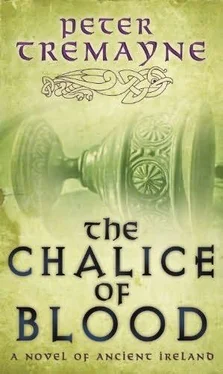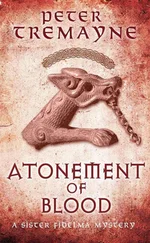Peter Tremayne - Chalice of Blood
Здесь есть возможность читать онлайн «Peter Tremayne - Chalice of Blood» весь текст электронной книги совершенно бесплатно (целиком полную версию без сокращений). В некоторых случаях можно слушать аудио, скачать через торрент в формате fb2 и присутствует краткое содержание. Жанр: Исторический детектив, на английском языке. Описание произведения, (предисловие) а так же отзывы посетителей доступны на портале библиотеки ЛибКат.
- Название:Chalice of Blood
- Автор:
- Жанр:
- Год:неизвестен
- ISBN:нет данных
- Рейтинг книги:5 / 5. Голосов: 1
-
Избранное:Добавить в избранное
- Отзывы:
-
Ваша оценка:
- 100
- 1
- 2
- 3
- 4
- 5
Chalice of Blood: краткое содержание, описание и аннотация
Предлагаем к чтению аннотацию, описание, краткое содержание или предисловие (зависит от того, что написал сам автор книги «Chalice of Blood»). Если вы не нашли необходимую информацию о книге — напишите в комментариях, мы постараемся отыскать её.
Chalice of Blood — читать онлайн бесплатно полную книгу (весь текст) целиком
Ниже представлен текст книги, разбитый по страницам. Система сохранения места последней прочитанной страницы, позволяет с удобством читать онлайн бесплатно книгу «Chalice of Blood», без необходимости каждый раз заново искать на чём Вы остановились. Поставьте закладку, и сможете в любой момент перейти на страницу, на которой закончили чтение.
Интервал:
Закладка:
‘Not at all. Our cemetery to the east, where Donnchad himself is now buried, is a low-lying flatland surrounded by trees. But our chapel was originally built on a mound because our founder wanted it to overlook the community. The only people buried there are our founder, Mo-Chuada, and his successor, Abbot Cuanan. No one else.’
‘I will not pursue this matter with Brother Gáeth for the moment, for I need to gather a few more facts,’ Fidelma said. ‘It shall remain a secret between us.’
‘You are a discerning person, Fidelma of Cashel. I know that. Otherwise I would not have invited you here to investigate this case.’ The abbot fidgeted, as if trying to formulate words to express what was on his mind, ‘You said that you detected some resentment in Gáeth. Now that you know he has lied to you about the last time he saw Brother Donnchad, what do you think?’
‘I think you should tell me what is on your mind,’ prompted Fidelma.
‘While Brother Donnchad was in this community, he seemed to exercise a control over Gáeth that calmed him and made him at peace with his lot in the scheme of things.
‘And when Brother Donnchad was due to set out on hispilgrimage, Gáeth at first wanted to accompany him and his brother Cathal. That concerned me and it was explained that such a thing was not possible.’
‘What reason did you give?’
Abbot Iarnla shrugged. ‘Simple enough. Cathal was against it and so was Lady Eithne.’
‘Since when does Lady Eithne pronounce rules for this community to obey?’ queried Eadulf.
Abbot Iarnla looked uncomfortable. ‘I have already explained to you that this land is under her jurisdiction according to the law of the Fénechus.’
‘We appreciate that. And this accounts for her control?’ asked Eadulf.
‘Under the law and with the judgement of the Brehons,’ confirmed the abbot patiently. ‘On the matter of the pilgrimage, Cathal probably made his views known to his mother and she made her views known to me. Gáeth was to remain here in the abbey while Cathal and Donnchad proceeded on their pilgrimage. Gáeth was not happy to see his lifetime’s friend and companion leave, especially in view of the fact that Donnchad was the only person among the brethren who seemed to have time to sit down and talk to him.’
‘But then Donnchad returned.’
‘Donnchad returned,’ sighed the abbot. ‘But not the same Donnchad who left, as has been explained to you. Can you imagine what his rejection of his former soul friend meant to Gáeth?’
There was a silence.
‘I once knew a man,’ said Eadulf suddenly in a reflective tone. ‘He had a dog whom he petted and fussed over. The dog went everywhere with him, even slept on his bed. Then the man met a woman. They married. The dog was no longer important and was chased out of the bedroom and when it whined andhowled, it was chased from the house. When it continued to whine and howl, the man chased it from the village, throwing stones at it. As he did so, the dog, angered by the rejection and hurt by the flying stones, leapt for the man and bit him in the throat. The man died.’ Eadulf regarded the abbot expectantly. Finally Abbot Iarnla stirred.
‘You must draw your own conclusions,’ he said. ‘I am just recounting the facts. I will see you in the refectorium this evening.’
They watched him walk away and then Fidelma turned to Eadulf. ‘I cannot see Gáeth having the ability to carry out this killing. The lock, the manuscripts … no. It is too complicated.’
Eadulf pulled a face. ‘But the motive is there. Gáeth could have killed Donnchad in resentment and retaliation for his rejection. It’s a logical suggestion.’
Fidelma shook her head but did not answer.
CHAPTER EIGHT
The tech-screptra , or scriptorium , was a large wooden structure located next to a muddy area from which a new stone building was rising. Several men were at work on the site, some carrying stones, others sawing and nailing wood. There was no sign of Glassán, the master builder, but they presumed that he would be somewhere in the construction. The wooden scriptorium was the most imposing of the old buildings in the abbey complex. It was imposing not because of its size but in its design. It was an oblong two storeys high, with a frame of large oak timbers and covered with red yew planking decorated with intricate carvings of symbols and icons.
As they entered through large double oak doors, the first impression was of one great room that rose up to a high vaulted ceiling. The second floor, accessible by steep stairs at both ends of the room, was a gallery that ran round the building halfway up. The walls of the library were entirely covered by pels , or racks, from which hung tiaga lebar , leather book satchels. Each satchel contained one or more manuscripts, whose titles were labelled on the outside. The satchels were also used to carry books, especially by missionaries on their travels. They were regarded with great veneration. It was famously told that when Longarad of Sliabh Mairge, a friend of Colmcille and the mosteminent scholar of his age, died, the book satchels of Ireland fell down from their racks.
At the far end of the scriptorium , underneath two large windows that were designed to let in as much light as possible, were six desks. Each had an elaborately edged flat top placed on a carved wooden plinth shaped like a tripod. Six young members of the brethren were bent over books placed on these. One hand used a maulstick to support their wrists while they wrote industriously with the other.
A fleshy-faced man who had been overseeing one of the busy scribes looked up and saw them. He came waddling towards them, for he was overweight and moved awkwardly. His heavy flushed jowls seemed to move of their own accord but there was a friendly smile on his features.
‘Sister Fidelma! You are most welcome. Welcome. As soon as I heard you were in the abbey, I knew that you would come to visit me before long.’
Fidelma held out both hands to take the fat man’s great paw between them.
‘Brother Donnán, it is good to see you again.’
The man beamed happily at her remembrance of him. ‘It is some years since you were here last and then sitting in judgement in the court …’ he began.
‘And you were my clerk and helped to keep the court in order,’ responded Fidelma. She turned to Eadulf. ‘Brother Donnán is the leabhar coimedach here,’ she said, using the Irish term. ‘This is Eadulf.’
‘Greetings, Brother Eadulf.’ Brother Donnán smiled. ‘I am called the scriptor these days. Brother Lugna, our steward, prefers us to use the Roman titles rather than our own Irish ones.’ He suddenly chuckled. ‘Yet he finds it difficult to get people to call him Œconomus instead of rechtaire .’
‘Brother Lugna is the only senior member of the community I have seen here with a Roman tonsure,’ Fidelma remarked.
‘That is true,’ agreed Brother Donnán. ‘And true again that our rechtaire is keen to adopt the ideas agreed at the councils at Streonshalh and at Autun. He wants the abbey to bring in Roman usage and the Rule of Benedict. He has already brought in several new rules.’
‘And what does the community say?’
‘We elect to follow our own liturgy. But Brother Lugna, as steward, makes small changes here and there, such as our titles of office. These changes can be tolerated. But he has begun to discourage the old concepts of the conhospitae . He is one of the aesthetes that favours celibacy.’
‘I had noticed that there were few women in your community now,’ murmured Fidelma.
‘Indeed, and they will not be here long for already arrangements have been made for them to move. This idea of celibacy among us seems to be spreading quickly now.’
Читать дальшеИнтервал:
Закладка:
Похожие книги на «Chalice of Blood»
Представляем Вашему вниманию похожие книги на «Chalice of Blood» списком для выбора. Мы отобрали схожую по названию и смыслу литературу в надежде предоставить читателям больше вариантов отыскать новые, интересные, ещё непрочитанные произведения.
Обсуждение, отзывы о книге «Chalice of Blood» и просто собственные мнения читателей. Оставьте ваши комментарии, напишите, что Вы думаете о произведении, его смысле или главных героях. Укажите что конкретно понравилось, а что нет, и почему Вы так считаете.











